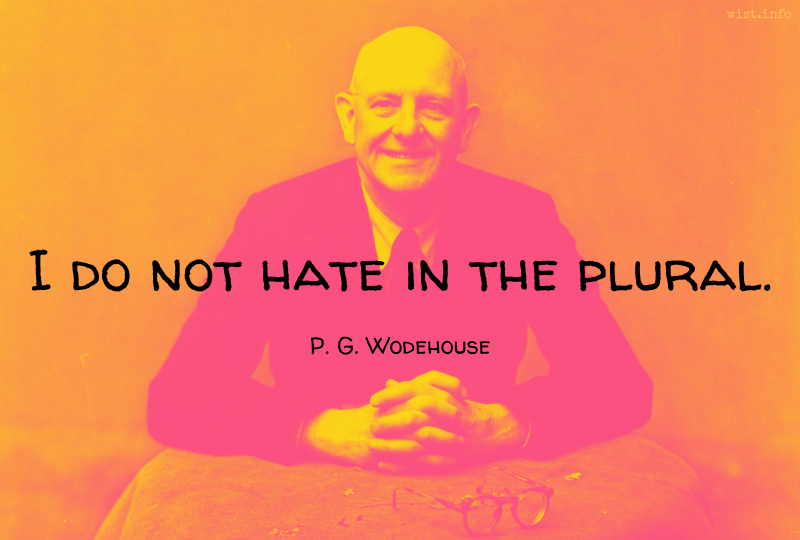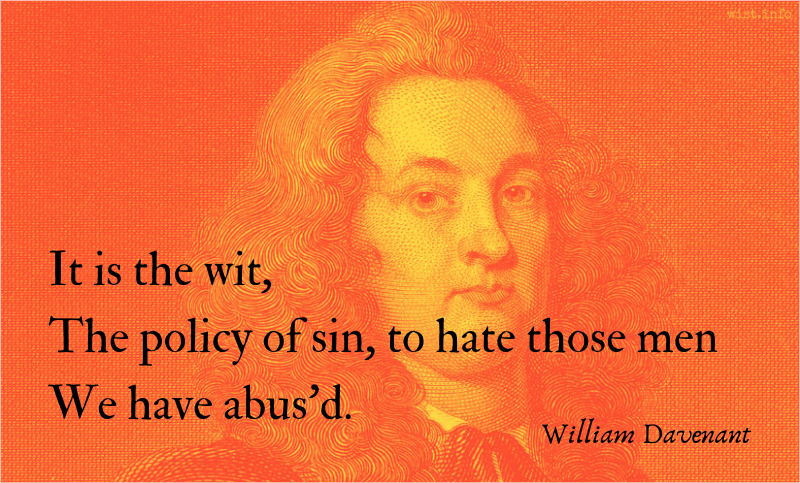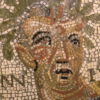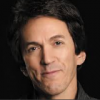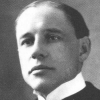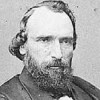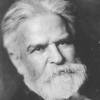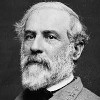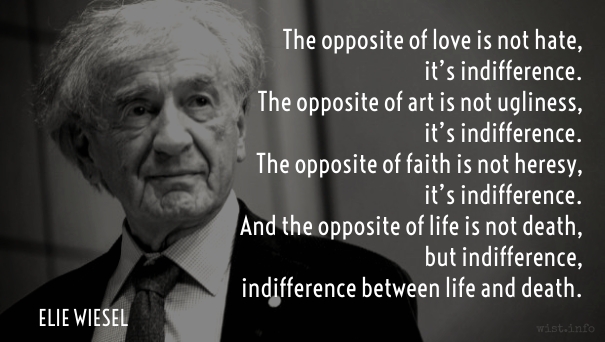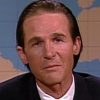There is no argument in the World carries the hatred that a Religious belief one does.
Will Rogers (1879-1935) American humorist
Column (1924-01-20), “Weekly Article: Send Mexico Our Wooden Ships, Too” [No. 58]
(Source)
Commenting on some sort of theological conflict in the American Episcopal Church going on at the time.
Quotations about:
hatred
Note not all quotations have been tagged, so Search may find additional quotes on this topic.
Man is subject to innumerable pains and sorrows by the very condition of humanity, and yet, as if nature had not sown evils enough in life, we are continually adding grief to grief, and aggravating the common calamity by our cruel treatment of one another.
Joseph Addison (1672-1719) English essayist, poet, statesman
Essay (1711-09-13), The Spectator, No. 169
(Source)
To correct the evils, great and small, which spring from want of sympathy, and from positive enmity, among strangers, as nations, or as individuals, is one of the highest functions of civilization.
Abraham Lincoln (1809-1865) American lawyer, politician, US President (1861-65)
Speech (1859-09-30), Wisconsin State Agricultural Society, Milwaukee
(Source)
In civilised life domestic hatred usually expresses itself by saying things which would appear quite harmless on paper (the words are not offensive) but in such a voice, or at such a moment, that they are not far short of a blow in the face.
C. S. Lewis (1898-1963) English writer, literary scholar, lay theologian [Clive Staples Lewis]
The Screwtape Letters, Letter 3 (1942)
(Source)
He who don’t luv himself vents hiz spleen bi hating everyboddy else.
[He who doesn’t love himself vents his spleen by hating everybody else.]
Josh Billings (1818-1885) American humorist, aphorist [pseud. of Henry Wheeler Shaw]
Everybody’s Friend, Or; Josh Billing’s Encyclopedia and Proverbial Philosophy of Wit and Humor, ch. 281 “Variety: Bred and Butter” (1874)
(Source)
CALVIN: I’m writing a fund-raising letter. The secret to getting donations is to depict everyone who disagrees with you as the enemy. Then you explain how they’re systematically working to destroy everything you hold dear. It’s a War of Values! Rational discussion is hopeless! Compromise is unthinkable! Our only hope is well-funded antagonism, so we need your money to keep up the fight!
HOBBES: How cynically unconstructive.
CALVIN: Enmity sells.
No one is happy who lives such a life that his murder would be no crime, but would rather redound to the credit of his murderer.
[Beatus est nemo qui ea lege vivit, ut non mode impune, sed etiam cum summa interfectoris gloria interfici potest.]
Marcus Tullius Cicero (106-43 BC) Roman orator, statesman, philosopher
Philippics [Philippicae; Antonian Orations, No. 1, ch. 14 / sec. 35 (1.14/1.35) (44-09-02 BC) [ed. Harbottle (1906)]
(Source)
See Achebe.
(Source (Latin)). Other translations:No one is happy who lives upon such terms that his death not only goes unpunished, but even brings the highest glory to his murderers.
[tr. King (1877)]No one is happy who holds his life on such terms that he may be slain, not only with impunity, but even to the greatest glory of his slayer.
[tr. Ker (Loeb) (1926)]No one is happy who lives on such terms that he may be put to death not merely with impunity, but even to the great glory of his slayer.
[tr. Yonge (1903)]No one is happy whose life is lived by this law: not only can someone kill him with impunity, but the killer gains enormous fame from the deed.
[tr. McElduff (2011)]
MME PERNELLE: That virtue here below is hated ever;
The envious may die, but envy never.[La vertu dans le monde est toujours poursuivie;
Les envieux mourront, mais non jamais l’envie.]Molière (1622-1673) French playwright, actor [stage name for Jean-Baptiste Poquelin]
Tartuffe, or the Hypocrite [Le Tartuffe, ou L’Imposteur], Act 5, sc. 3 (1669) [tr. Page (1909)]
(Source)
Talking with Orgon, dismissing the accusations made against Tartuffe as envy and malice, using a saying she told him as a child.
See also Act 1, sc. 1.
(Source (French)). Alternate translations:That Virtue here is persecuted ever;
That envious Men may die, but Envy never.
[tr. Clitandre (1672)]That virtue here is persecuted ever;
That envious men may die, but envy never.
[tr. Van Laun (1876)]That in this world virtue is ever liable to persecution, and that, although the envious die, envy never dies.
[tr. Wall (1879)]Virtue here is persecuted ever;
The envious will die, but envy never.
[tr. Mathew (1890)]That in this world virtue is ever persecuted, and that the envious may die, but envy never.
[tr. Waller (1903)]Virtue is always unpopular in this world;
The envious, they will die, but envy won't.
[tr. Bishop (1957)]That virtue in this world is hated ever;
Malicious men may die, but malice never.
[tr. Wilbur (1963)]Virtue is always harassed here below;
The envious will die, but envy, no.
[tr. Frame (1967)]The envious die, but envy won't.
[tr. Bolt (2002)]Virtue is always a target -- envious people may die, envy doesn't.
[tr. Steiner (2008)]
He who ascends to mountain-tops, shall find
The loftiest peaks most wrapt in clouds and snow;
He who surpasses or subdues mankind
Must look down on the hate of those below.George Gordon, Lord Byron (1788-1824) English poet
Childe Harold’s Pilgrimage, Canto 3, st. 45 (1816)
(Source)
In manuscript form, the last line is "Must look down on the hate of all below."
Most men know what they hate, few what they love.
Charles Caleb "C. C." Colton (1780-1832) English cleric, writer, aphorist
Lacon: Or, Many Things in Few Words, Vol. 1, § 525 (1820)
(Source)
Gratitude without familiarity, gratitude otherwise than as a nameless element in a friendship, is a thing so near to hatred that I do not care to split the difference. Until I find a man who is pleased to receive obligations, I shall continue to question the tact of those who are eager to confer them.
Robert Louis Stevenson (1850-1894) Scottish essayist, novelist, poet
Essay (1888-03), “Beggars,” sec. 4 Scribner’s Magazine, Vol. 3, No. 3
(Source)
Collected in Across the Plains, ch. 9 (1892).
But I have seen the beauty of good, and the ugliness of evil, and have recognized that the wrongdoer has a nature related to my own — not of the same blood or birth, but the same mind, and possessing a share of the divine. And so none of them can hurt me. No one can implicate me in ugliness. Nor can I feel angry at my relative, or hate him.
[ἐγὼ δὲ τεθεωρηκὼς τὴν φύσιν τοῦ ἀγαθοῦ ὅτι καλόν, καὶ τοῦ κακοῦ ὅτι αἰσχρόν, καὶ τὴν αὐτοῦ τοῦ ἁμαρτάνοντος φύσιν ὅτι μοι συγγενής, οὐχὶ αἵματος ἢ σπέρματος τοῦ αὐτοῦ, ἀλλὰ νοῦ καὶ θείας ἀπομοίρας μέτοχος, οὔτε βλαβῆναι ὑπό τινος αὐτῶν δύναμαι: αἰσχρῷ γάρ με οὐδεὶς περιβαλεῖ: οὔτε ὀργίζεσθαι τῷ συγγενεῖ δύναμαι οὔτε ἀπέχθεσθαι αὐτῷ.]
Marcus Aurelius (AD 121-180) Roman emperor (161-180), Stoic philosopher
Meditations [To Himself; Τὰ εἰς ἑαυτόν], Book 2, ch. 1 (2.1) [tr. Hays (2003)]
(Source)
(Source (Greek)). Alternate translations:But I that understand the nature of that which is good, that it only is to be desired, and of that which is bad, that it only is truly odious and shameful: who know moreover, that this transgressor, whosoever he be, is my kinsman, not by the same blood and seed, but by participation of the same reason, and of the same divine particle; How can I either be hurt by any of those, since it is not in their power to make me incur anything that is truly reproachful? or angry, and ill affected towards him, who by nature is so near unto me?
[tr. Casaubon (1634), 1.15]And since it's fallen to my share to understand the Natural Beauty of a good Action, and the Deformity of an ill One; since I am satisfied the Person disobliging is of Kin to me, and tho we are not just of the same Flesh and Blood, yet our Minds are nearly related, being both extracted from the Deity; since I am likewise convinc'd that no Man can do me a real injury, because no Man can force me to misbehave my self; For these Reasons, I can't find in my Heart to Hate, or to be Angry with one of my own Nature and Family.
[tr. Collier (1701)]But I have fully comprehended the nature of good, as only what is beautiful and honourable; and of evil, that it is always deformed and shameful; and the nature of those persons too who mistake their aim; that they are my kinsmen, by partaking, not of the same blood or seed, but of the same intelligent divine part; and that I cannot be hurt by any of them, since none of them can involve me in any thing dishonourable or deformed. I cannot be angry at my kinsmen, or hate them.
[tr. Hutcheson/Moor (1742)]But I, who have a more just idea of things, that nothing is good, but what is honourable, and nothing evil, but what is base; and am also sensible that the persons who offend me are in some sense allied to me, (I do not mean of the same flesh and blood, but that our souls are derived from, and particles of, the same divine nature) I can neither suffer any real injury from them, because they cannot compel me to do a base action; nor can I be angry with or hate thoe whom I consider as of the same nature and the same family with myself.
[tr. Graves (1792)]But I who have seen the nature of the good that it is beautiful, and of the bad that it is ugly, and the nature of him who does wrong, that it is akin to me; not [only] of the same blood or seed, but that it participates in [the same] intelligence and [the same] portion of the divinity, I can neither be injured by any of them, for no one can fix on me what is ugly, nor can I be angry with my kinsman, nor hate him.
[tr. Long (1862)]Since it has fallen to my share to understand the natural beauty of a good action, and the deformity of an ill one -- since I am satisfied the person disobliging is of kin to me, and though we are not just of the same flesh and blood, yet our minds are nearly related, being both extracted from the Deity I am likewise convinced that no man can do me a real injury, because no man can force me to misbehave myself, nor can I find it in my heart to hate or to be angry with one of my own nature and family.
[tr. Collier/Zimmern (1887)]But seeing that I have beheld the nature and nobility of good, and the nature and meanness of evil, and the nature of the sinner, who is my brother, participating not indeed in the same flesh and blood, but in the same mind and partnership with the divine, I cannot be injured by any of them; for no man can involve me in what demeans. Neither can I be angry with my brother, or quarrel with them.
[tr. Rendall (1898)]But I have considered the nature of the good, and found it beautiful: I have beheld the nature of the bad, and found it ugly. I also understand the nature of the evil-doer, and know that he is my brother, not because he shares with me the same blood or the same seed, but because he is a partaker of the same mind and of the same portion of immortality. I therefore cannot be hurt by any of these, since none of them can involve me in any baseness. I cannot be angry with my brother, or sever myself from him.
[tr. Hutcheson/Chrystal (1902)]But I, in that I have comprehended the nature of the Good that it is beautiful, and the nature of Evil that it is ugly, and the nature of the wrong-doer himself that it is akin to me, not as partaker of the same blood and seed but of intelligence and a morsel of the Divine, can neither be injured by any of them -- for no one can involve me in what is debasing -- nor can I be wroth with my kinsman and hate him.
[tr. Haines (Loeb) (1916)]But I, because I have seen that the nature of good is the right, and of ill the wrong, and that the nature of the man himself who does wrong is akin to my own (not of the same blood and seed, but partaking with me in mind, that is in a portion of divinity), I can neither be harmed by any of them, for no man will involve me in wrong, nor can I be angry with my kinsman or hate him.
[tr. Farquharson (1944)]But for my part I have long perceived the nature of good and its nobility, the nature of evil and its meanness, and also the nature of the culprit himself, who is my brother (not in the physical sense, but as a fellow-creature similarly endowed with reason and a share of the divine); therefore none of those things can injure me, for nobody can implicate me in what is degrading. Neither can I be angry with my brother or fall foul of him.
[tr. Staniforth (1964)]But I, who have beheld the nature of the good, and seen that it is the right; and of the bad, and seen that it is the wrong; and for the wrongdoer himself, and seeing that his nature is akin to my own -- not because he is of the same blood and seed, but because he shares with me in mind and a portion of the divine -- I, then, can neither be harmed by any of these men, nor can I become angry with one who is akin to me, nor can I hate him.
[tr. Hard (1997 ed.)]But I have seen that the nature of good is what is right, and the nature of evil what is wrong; and I have reflected that the nature of the offender himself is akin to my own -- not a kinship of blood or seed, but a sharing in the same mind, the same fragment of divinity. Therefore I cannot be harmed by any of them, as none will infect me with their wrong. Nor can I be angry with my kinsman or hate him.
[tr. Hammond (2006)]But insofar as I have comprehended the true nature of what is good, namely that it is fine and noble, and the true nature of what is bad, that it is shameful, and the true nature of the person who has gone astray: that he is just like me, not only in the physical sense but also with respect to Intelligence and having a portion of the divine -- insofar as I have comprehended all this, I can neither be harmed by any of them, for no one else can involve me in what is shameful and debasing, nor can I be angry with my fellow man or hate him.
[tr. Needleman/Piazza (2008)]But I, who have observed the nature of the good, and seen that it is the right; and of the bad, and seen that it is the wrong; and of the wrongdoer himself, and seen that his nature is akin to my own -- not because he is of the same blood and seed, but because he shares as I do in mind and thus in a portion of the divine -- I, then, can neither be harmed by these people, nor become angry with one who is akin to me, nor can I hate him.
[tr. Hard (2011 ed.)]But I have recognized the nature of the good and seen that it is the right, and the nature of the bad and seen that it is the wrong, and nature of th wrongdoer himself, and seen that he is related to me, not because he has the same blood or seed, but because he shares in the same mind and portion of divinity. So I cannot be harmed by any of them, as no one will involve me in what is wrong. Nor can I be angry with my relative or hate him.
[tr. Gill (2013)]But I, who know what is truly beautiful and truly ugly, and who know the wickedness of their hearts, also know that all these people are akin to me, that they are part of the same divine pattern. I cannot be injured by any of them, for no one can force me to see the world the way they do. Neither can I hate them, for both they and I need each other.
[tr. McNeill (2019)]
In a republic, to be successful we must learn to combine intensity of conviction with a broad tolerance of difference of conviction. Wide differences of opinion in matters of religious, political, and social belief must exist if conscience and intellect alike are not to be stunted, if there is to be room for healthy growth. Bitter internecine hatreds, based on such differences, are signs not of earnestness of belief but of that fanaticism which, whether religious or anti-religious, democratic or anti-democratic, is itself but a manifestation of the gloomy bigotry which has been the chief factor in the downfall of so many, many nations.
Theodore Roosevelt (1858–1919) American politician, statesman, conservationist, writer, US President (1901–1909)
Speech (1910-04-23), “Citizenship in a Republic [The Man in the Arena],” Sorbonne, Paris
(Source)
His motives were outrage that had become a habit of mind, the bitterness in his heart, a deep sense of the iniquities he had suffered, the impulse to react, even against the good, the innocent and the just, if there be any. The point of departure and of arrival in all his thinking was his hatred of human law; a hatred that if not arrested in its development by some providential occurrence becomes within a given time hatred of society, then hatred of the human race, then hatred of creation, as is reflected in an ill-defined, constant and brutal desire to inflict harm on no matter whom, on any living creature.
[Il avait pour mobiles l’indignation habituelle, l’amertume de l’âme, le profond sentiment des iniquités subies, la réaction, même contre les bons, les innocents et les justes, s’il y en a. Le point de départ comme le point d’arrivée de toutes ses pensées était la haine de la loi humaine ; cette haine qui, si elle n’est arrêtée dans son développement par quelque incident providentiel, devient, dans un temps donné, la haine de la société, puis la haine du genre humain, puis la haine de la création, et se traduit par un vague et incessant et brutal désir de nuire, n’importe à qui, à un être vivant quelconque.]
Victor Hugo (1802-1885) French writer
Les Misérables, Part 1 “Fantine,” Book 2 “The Fall,” ch. 7 (1.2.7) (1862) [tr. Donougher (2013)]
(Source)
Describing Jean Valjean, "a highly dangerous man," after his parole.
(Source (French)). Alternate translations:He had as motives, habitual indignation, bitterness of soul, a deep sense of injuries suffered, a reaction even against the good, the innocent, and the upright, if any such there are. The beginning as well as the end of all his thoughts was hatred of human law; that hatred which, if it be not checked in its growth by some providential event, becomes, in a certain time, hatred of society, then hatred of the human race, and then hatred of creation, and reveals itself by a vague and incessant desire to injure some living being, it matters not who.
[tr. Wilbour (1862)]He had for his motives habitual indignation, bitterness of soul, the profound feeling of iniquities endured, and reaction even against the good, the innocent, and the just, if such exist. The starting-point, like the goal, of all his thoughts was hatred of human law; that hatred, which, if it be not arrested in its development by some providential incident, becomes within a given time a hatred of society, then a hatred of the human race, next a hatred of creation, and is expressed by a vague, incessant, and brutal desire to injure some one, no matter whom.
[tr. Wraxall (1862)]He had for moving causes his habitual wrath, bitterness of soul, a profound sense of indignities suffered, the reaction even against the good, the innocent, and the just, if there are any such. The point of departure, like the point of arrival, for all his thoughts, was hatred of human law; that hatred which, if it be not arrested in its development by some providential incident, becomes, within a given time, the hatred of society, then the hatred of the human race, then the hatred of creation, and which manifests itself by a vague, incessant, and brutal desire to do harm to some living being, no matter whom.
[tr. Hapgood (1887)]His impulses were governed by resentment, bitterness and a profound sense of injury which might vent itself even upon good and innocent people, if any such came his way. The beginning and the end of all his thought was hatred of human laws: a hatred which, if some providential happening does not arrest its growth, may swell in time into a hatred of all society, all mankind, all created things, becoming a savage and obsessive desire to inflict harm on no matter what or whom.
[tr. Denny (1976)]As motives, he had habitual indignation, bitterness, a deep sense of injury, a reaction even against the good, the innocent, and the upright, in the unlikely event he encountered them. The beginning and end of all his thoughts was hatred of human law; that hatred which, if not checked in its growth by some providential event, becomes in time a hatred of society, then hatred of the human race, then hatred of creation, revealing itself by a vague, incessant desire to injure some living being, no matter who.
[tr. Wilbour/Fahnestock/MacAfee (1987)]
ALCESTE: Some men I hate for being rogues; the others
I hate because they treat the rogues like brothers,
And, lacking a virtuous scorn for what is vile,
Receive the villain with a complaisant smile.
[Je hais tous les hommes:
Les uns, parce qu’ils sont méchants et malfaisants,
Et les autres, pour être aux méchants complaisants,
Et n’avoir pas pour eux ces haines vigoureuses
Que doit donner le vice aux âmes vertueuses.]Molière (1622-1673) French playwright, actor [stage name for Jean-Baptiste Poquelin]
Le Misanthrope, Act 1, sc. 1 (1666) [tr. Wilbur (1954)]
(Source)
(Source (French)). Alternate translations:I hate all men: some, because they are wicked and mischievous; others because they lend themselves to the wicked, and have not that healthy contempt with which vice ought to inspire all virtuous minds.
[tr. Van Laun (1878)]I hate all men -- some because they are wicked and mischievous, and others for being complaisant to -- the wicked, and not having that vigorous hatred for them which vice ought to excite in all virtuous minds.
[tr. Mathew (1890)]I hate all men: some because they are wicked and evil-doers; others because they fawn upon the wicked, and dare not show that vigorous hatred which virtuous souls should feel to vice.
[tr. Wormeley (1894)]I hate all men: some, because they are wicked and mischievous; others, because they are lenient towards the wicked, and have not that healthy contempt for them with which vice ought to inspire all honest souls.
[tr. Waller (1903)]I hate all men:
A part, because they’re wicked and do evil;
The rest, because they fawn upon the wicked,
And fail to feel for them that healthy hatred
Which vice should always rouse in virtuous hearts.
[tr. Page (1913)]I detest all men;
Some because they are wicked and do evil,
Others because they tolerate the wicked,
Refusing them the active, vigorous scorn
Which vice should stimulate in virtuous minds.
[tr. Bishop (1957)]I hate all men:
For some are wholly bad in thought and deed;
The others, seeing this, pay little heed;
For they are too indulgent and too nice
To share the hate that virtue has for vice.
[tr. Frame (1967)]
He whom the good praize and wicked hate ought tew be satisfied with hiz reputashun.
[He whom the good praise and the wicked hate ought to be satisfied with his reputation.]Josh Billings (1818-1885) American humorist, aphorist [pseud. of Henry Wheeler Shaw]
Everybody’s Friend, Or; Josh Billing’s Encyclopedia and Proverbial Philosophy of Wit and Humor, ch. 150 “Affurisms: Parboils” (1874)
(Source)
Instinctively we divide mankind into friends and foes — friends, towards whom we have the morality of co-operation; foes, towards whom we have that of competition. But this division is constantly changing; at one moment a man hates his business competitor, at another, when both are threatened by Socialism or by an external enemy, he suddenly begins to view him as a brother. Always when we pass beyond the limits of the family it is the external enemy which supplies the cohesive force. In times of safety we can afford to hate our neighbour, but in times of danger we must love him.
Bertrand Russell (1872-1970) English mathematician and philosopher
Authority and the Individual, Lecture 1 (1949)
(Source)
Collection, with some edits, of the inaugural Reith Lectures, BBC, "Authority and the Individual," No. 1 "Social Cohesion and Human Nature" [14:16] (1948-12-26).
These two hated with a hate
Found only on the stage.
MESSENGER: I see, lady, the gentleman is not in your books.
BEATRICE: No. An he were, I would burn my study.
William Shakespeare (1564-1616) English dramatist and poet
Much Ado About Nothing, Act 1, sc. 1, l. 76ff (1.1.76-78) (1598)
(Source)
The moral thing I wish to say to [future generations] is very simple. I should say love is wise, hatred is foolish. In this world which is getting more and more closely interconnected, we have to learn to tolerate each other. We have to learn to put up with the fact that some people say things that we don’t like. We can only live together in that way, and if we are to live together and not die together we must learn the kind of charity and kind of tolerance which is absolutely vital to the continuation of human life on this planet.
Bertrand Russell (1872-1970) English mathematician and philosopher
Interview by John Freeman, Face to Face, BBC TV (1959-03-04)
(Source)
Christians are beginning to lose the spirit of intolerance which animated them: experience has shown the error of the expulsion of the Jews from Spain, and of the persecution of those Christians in France whose belief differed a little from that of the king. They have realized that zeal for the advancement of religion is different from a due attachment to it; and that in order to love it and fulfill its behests, it is not necessary to hate and persecute those who are opposed to it.
[On commence à se défaire parmi les chrétiens de cet esprit d’intolérance qui les animoit : on s’est mal trouvé en Espagne, de les avoir chassés, et en France, d’avoir fatigué des chrétiens dont la croyance différoit un peu de celle du prince. On s’est aperçu que le zèle pour les progrès de la religion est différent de l’attachement qu’on doit avoir pour elle ; et que, pour l’aimer et l’observer, il n’est pas nécessaire de haïr et de persécuter ceux qui ne l’observent pas.]
Charles-Lewis de Secondat, Baron de Montesquieu (1689-1755) French political philosopher
Persian Letters [Lettres Persanes], Letter 60, Usbek to Ibben (1721) [tr. Davidson (1891)]
(Source)
Referring to the expulsion of Jews from Spain in 1492, and the persecution of the Huguenots (Protestants) in France culminating under Louis XIV in the late 17th Century (and who were still being persecuted while Montesquieu was writing this).
(Source (French)). Alternate translations:The Christians begin to lay aside that untolerating Spirit, which used to sway them: the Spaniards are sensible how much they have lost by driving the Jews out, and the French by vexing of Christians whose Belief differed a little from that of the Prince. They are now convinced that the Zeal for the Progress of a Religion, is very different form the Devotion she requires; and that to love and observe her, there is no manner of Necessity for hating and persecuting those who do not.
[tr. Ozell (1736), Letter 58]Christians begin to lay aside that intolerating spirit which formerly influenced them. Spain hath experienced the bad consequence of having expelled the Jews, and France of having worried the Christians, whose faith differed a little from that of the prince. They are nos sensible that a zeal for the progress of religion is different from that attachment which ought to be preserved towards her; and that, in order to love and obey her, it is not necessary to hate and persecute those who do not regard her.
[tr. Floyd (1762)]Christians are fast losing that spirit of intolerance which formerly animated them: they are beginning to find out that the expulsion of the Jews from Spain was a mistake, and that the persecution of Christians in France whose beliefs differed a little from those of their sovereign was another. They have discovered that fanatic zeal for the advancement of a religion is far different from the attachment which every one ought to feel towards it, and that, in order to love and practise its precepts, it is not necessary to hate and afflict those who refuse to do so.
[tr. Betts (1897)]The Christians are beginning to lose that spirit of intolerance which animated them. It is now seen that it was a mistake to chase the Jews from Spain, and to persecute French Christians whose belief differed a bit from that of the king. They now perceive that zeal for the expansion of religion is different from dutiful devotion to it, and that love and observance of a religion need not require hatred and persecution of those who do not so believe.
[tr. Healy (1964)]Christians are beginning to abandon that spirit of intolerance which formerly inspired them; the Spanish regret having banished the Jews, and the French regret having persecuted Christians whose beliefs differed slightly from those of their monarch. They have realized that zeal for the advancement of religion is different form the love one should bear it, and that in order to love it, and observe its precepts, there is no need to hate and persecute those who do not do so.
[tr. Mauldon (2008), Letter 58]The Christians are beginning to abandon that old spirit of religious intolerance; it was a mistake to expel the Jews from Spain, just as it was to persecute the Christians in France whose beliefs differed only slightly from those of their king. They have realized here that zeal for the advancement of one's religion is different from the attachment one ought to have for it, and that to love and observe one's faith, it is not necessary to hate and persecute those who do not observe it.
[tr. MacKenzie (2014)]
My first job after college was as a teacher in Cotulla, Texas, in a small Mexican-American school. Few of them could speak English, and I couldn’t speak much Spanish. My students were poor and they often came to class without breakfast, hungry. They knew even in their youth the pain of prejudice. They never seemed to know why people disliked them. But they knew it was so, because I saw it in their eyes. I often walked home late in the afternoon, after the classes were finished, wishing there was more that I could do. But all I knew was to teach them the little that I knew, hoping that it might help them against the hardships that lay ahead.
Somehow you never forget what poverty and hatred can do when you see its scars on the hopeful face of a young child.Lyndon B. Johnson (1908-1973) American politician, educator, US President (1963-69)
Speech (1965-03-15), “The American Promise,” Joint Session of Congress [40:55]
(Source)
Some think they see their own hope to advance
tied to their neighbor’s fall, and thus they long
to see him cast down from his eminence;
Some fear their power, preferment, honor, fame
will suffer by another’s rise, and thus,
irked by his good, desire his ruin and shame;
And some at the least injury catch fire
and are consumed by thoughts of vengeance; thus,
their neighbor’s harm becomes their chief desire.
[E’ chi, per esser suo vicin soppresso,
spera eccellenza, e sol per questo brama
ch’el sia di sua grandezza in basso messo;
è chi podere, grazia, onore e fama
teme di perder perch’altri sormonti,
onde s’attrista sì che ’l contrario ama;
ed è chi per ingiuria par ch’aonti,
sì che si fa de la vendetta ghiotto,
e tal convien che ’l male altrui impronti.]Dante Alighieri (1265-1321) Italian poet
The Divine Comedy [Divina Commedia], Book 2 “Purgatorio,” Canto 17, l. 115ff (17.115-123) (1314) [tr. Ciardi (1961)]
(Source)
Virgil explains to Dante how "bad" love -- love for self, love of another's harm -- can manifest as Pride, Envy, or Wrath toward others, the sins addressed in the first three tiers of Purgatory.
(Source (Italian)). Alternate translations:Those first the taints, that to their Neighbours' fall
Trust for distinction on this Earthly Ball,
In talents, wealth, or fame, and feed their pride
By the sad sight of others' hopes depress'd,
And o'er their ruin lift a lofty crest,
With Venom from the fount of Good supply'd.
The next that feel this sullen Stygian flame,
Are those, that fear to lose their wealth or fame,
Or any gift, by bounteous Heav'n assign'd;
And long possess'd of Fortune's turning wheel,
In its ascent another name reveal,
That threats to leave them, and their hopes behind.
Another evil thus becomes their good,
And feeds their black desires with Demon food. --
The third are they, who, with the sense of wrong,
Burn inward, or with fell, vindictive Wrath
Pursue their brethren to the Cave of Death,
By love of Pelf, or fiend-like Frenzy stung.
[tr. Boyd (1802), st. 28-30]There is who hopes (his neighbour’s worth deprest,)
Preeminence himself, and coverts hence
For his own greatness that another fall.
There is who so much fears the loss of power,
Fame, favour, glory (should his fellow mount
Above him), and so sickens at the thought,
He loves their opposite: and there is he,
Whom wrong or insult seems to gall and shame
That he doth thirst for vengeance, and such needs
Must doat on other’s evil.
[tr. Cary (1814)]There is, in order neighbour to suppress,
Who would excel, himself, his sole desire
Grandeur, that sees another in the mire:
There is who power, grace, and honour, fame,
Still fears to lose, because the rest surpass,
Grows sad, and loves the counteracting cause:
There is who, for injurious affront,
Revenge desires, thirsts for another's pain,
And hence to ill of others must attain.
[tr. Bannerman (1850)]There are, who, by abasement of their neighbour,
Hope to excel, and therefore only long
That from his greatness he may be cast down;
There are, who power, grace, honour, and renown
Fear they may lose because another rises,
Thence are so sad that the reverse they love;
And there are those whom injury seems to chafe,
So that it makes them greedy for revenge,
And such must needs shape out another's harm.
[tr. Longfellow (1867)]There is who, through his neighbour being kept down, hopes for excellence, and only for this reason yearns that he may be from his greatness brought low. There is who fears to lose power, grace, honour, and fame, in case another mounts up, wherefore he grows so sad that he loves the contrary. And there is who through injury appears so to take shame that he becomes gluttonous of vengeance; and such an one it behoves that he put forward another's ill.
[tr. Butler (1885)]There is, who through his neighbour's ruin, so
Hopeth pre-eminence, who hence doth call
That he from grandeur may be cast down low.
There is, who fears to lose power, grace, and all
Honour and fame, because that others rise.
Which grieves him so that he desires their fall.
There is, who seems so hurt by injuries,
That he on vengeance greedily doth brood;
And such a one another's ill must prize.
[tr. Minchin (1885)]There is he who hopes to excel through the abasement of his neighbor, and only longs that from his greatness he may be brought low. There is he who fears loss of power, favor, honor, fame, because another rises; whereat he is so saddened that he loves the opposite. And there is he who seems so outraged by injury that it makes him gluttonous of vengeance, and such a one must needs coin evil for others.
[tr. Norton (1892)]There is he who through his neighbour's abasement hopes to excel, and solely for this desires that he be cast down from his greatness;
there is he who fears to lose power, favour, honour and fame because another is exalted, wherefore he groweth sad so that he loves the contrary;
and there is he who seems to be so shamed through being wronged, that he becomes greedy of vengeance, and such must needs seek another's hurt.
[tr. Okey (1901)]There is he that hopes to excel by the abasement of his neighbour and for that sole reason longs that from his greatness he may be brought low; there is he that fears to lose power, favour, honour, and fame because another surpasses, by which he is so aggrieved that he loves the contrary; and there is he that feels himself so disgraced by insult that he becomes greedy of vengeance, and such a one must needs contrive another's harm.
[tr. Sinclair (1939)]There is, who through his neighbour's overthrow
Hopes to excel, and only for that cause
Longs that he may from greatness be brought low.
There is, who fears power, favour, fame to lose
Because another mounts; wherefore his lot
So irks, he loves the opposite to choose.
And there is, who through injury grows so hot
From shame, with greed of vengeance he is burned,
And so must needs another's ill promote.
[tr. Binyon (1943)]Some hope their neighbour’s ruin may divert
His glory to themselves, and this sole hope
Prompts them to drag his greatness in the dirt;
Some, in their fear to lose fame, favour, scope,
And honour, should another rise to power,
Wishing the worst, sit glumly there and mope;
And some there are whose wrongs have turned them sour,
So that they thirst for vengeance, and this passion
Fits them to plot some mischief any hour.
[tr. Sayers (1955)]There is he that hopes to excel by the abasement of his neighbor, and solely for this desires that he be cast down from greatness.
There is he that fears to lose power, favor, honor, and fame, because another is exalted, by which he is so saddened that he loves the contrary.
And there is he who seems so outraged by injury that he becomes greedy of vengeance, and such a one must needs contrive another's hurt.
[tr. Singleton (1973)]There is the man who sees his own success
connect to his neighbor's downfall; thus,
he longs to see him fall from eminence.
Next, he who fears to lose honor and fame,
power and favor, if his neighbor rise:
vexed by this good, he wishes for the words.
Finally, he who, wronged, flares up in rage:
with his great passion for revenge, he thinks
only of how to harm his fellow man.
[tr. Musa (1981)]There is the man who, through the suppression of his neighbour,
Hopes to excel, and for that reason only
Desires to see him cast down from his greatness:
There is the man who fears to lose power, favour,
Honour and glory because of another’s success,
And so grieves for it that he loves the opposite:
And there is the man who takes umbrage at injury
So that he becomes greedy for revenge
And such a man must seek to harm another.
[tr. Sisson (1981)]There’s he who, through abasement of another,
hopes for supremacy; he only longs
to see his neighbor’s excellence cast down.
Then there is one who, when he is outdone,
fears his own loss of fame, power, honor, favor;
his sadness loves misfortune for his neighbor.
And there is he who, over injury
received, resentful, for revenge grows greedy
and, angrily, seeks out another’s harm.
[tr. Mandelbaum (1982)]There are those who hope for supremacy through their neighbor’s being kept down, and only on this account desire that his greatness be brought low;
there are those who fear to lose power, favor, honor, or fame because another mounts higher, and thus are so aggrieved that they love the contrary;
and there are those who seem so outraged by injury that they become greedy for revenge, and thus they must ready harm for others.
[tr. Durling (2003)]There are those who hope to excel through their neighbour’s downfall, and because of this alone want them toppled from their greatness. This is Pride.
There are those who fear to lose, power, influence, fame or honour because another is preferred, at which they are so saddened they desire the contrary. This is Envy.
And there are those who seem so ashamed because of injury, that they become eager for revenge, and so are forced to wish another’s harm. This is Wrath.
[tr. Kline (2002)]Some hope, by keeping all their neighbours down, that they'll excel. They yearn for that alone -- to see them brought from high to low estate.
Then, some will fear that, if another mounts, they'll lose all honour, fame and grace and power, so, grieving at success, love what it’s not.
And some, it seems, when hurt, bear such a grudge that they crave only to exact revenge -- which means they seek to speed another’s harm.
[tr. Kirkpatrick (2007)]There is the one, hoping to excel by bringing down
his neighbor, who, for that sole reason, longs
that from his greatness his neighbor be brought low.
There is the one who fears the loss of power, favor,
honor, fame -- should he be bettered by another.
This so aggrieves him that he wants to see him fall.
And there is the one who thinks himself offended
and hungers after vengeance,
and he must then contrive another's harm.
[tr. Hollander/Hollander (2007)]First, there's the man who aspires to excellence
By pressing down his neighbor: only this yearning
Makes him strive to pull his neighbor to the ground.
Then there's the man with power, favor, and honor,
And so afraid of losing these when someone
Climbs above him, that he hates what once he loved.
And there's the man who, outraged at being insulted,
Lusts for the chance of taking revenge, and rushes
Into wicked plans for hurting others.
[tr. Raffel (2010)]
Hunt out and talk about the good that is in the other fellow’s church, not the bad, and you will do away with all this religious hatred you hear so much of nowadays.
In the main, I think religion has done a great deal of harm. Largely by sanctifying conservatism and adhesion to ancient habits, and still more by sanctifying intolerance and hatred. The amount of intolerance that has gone into religion, especially in Europe, is quite terrible.
Bertrand Russell (1872-1970) English mathematician and philosopher
Interview by Woodrow Wyatt, BBC TV (1959)
Collected in Bertrand Russell's BBC Interviews (1959) [UK] and Bertrand Russell Speaks His Mind (1960) [US]. Reprinted (abridged) in The Humanist (1982-11/12), and in Russell Society News, #37 (1983-02).
DRUMMOND: As long as the prerequisite for that shining paradise is ignorance, bigotry and hate, I say to hell with it.
Nedrick Young (1914-1968) American screenwriter and actor [pseud. Nathan E. Douglas]
Inherit the Wind, film (1960) [with Harold Jacob Smith]
(Source)
The original 1951 play was written by Jerome Lawrence and Robert E. Lee, but does not include this line, delivered in the film by Spencer Tracy. Young and Smith share the screenwriting credits.
Race hatred is one of the most cruel and least civilised emotions to which men in the mass are liable, and it is of the utmost importance for human progress that every possible method of diminishing it should be adopted.
Bertrand Russell (1872-1970) English mathematician and philosopher
“On Race Hatred,” New York American (1933-05-24)
(Source)
Modern wars are seldom fought without hatred between nations; this serves as a more or less substitute for the hatred between individuals. Even when there is no natural hatred and no animosity to start with, the fighting itself will stir up hostile feelings: violence committed on superior orders will stir up the desire for revenge and retaliation against the perpetrator rather than against the powers that ordered the action. It is only human (or animal, if you like), but it is a fact.
[Der Nationalhaß, an dem es auch bei unseren Kriegen selten fehlt, vertritt bei dem einzelnen gegen den einzelnen mehr oder weniger stark die individuelle Feindschaft. Wo aber auch dieser fehlt und anfangs keine Erbitterung war, entzündet sich das feindselige Gefühl an dem Kampfe selbst, denn eine Gewaltsamkeit, die jemand auf höhere Weisung an uns verübt, wird uns zur Vergeltung und Rache gegen ihn entflammen, früher noch, ehe wir es gegen die höhere Gewalt sein werden, die ihm gebietet, so zu handeln. Dies ist menschlich oder auch tierisch, wenn man will, aber es ist so.]
Karl von Clausewitz (1780-1831) Prussian soldier, historian, military theorist
On War [Vom Kriege], Book 2, ch. 2 “On the Theory of War [Über die Theorie des Krieges],” § 17 (2.2.17) (1832) [tr. Howard & Paret (1976)]
(Source)
(Source (German)). Alternate translations:National hatred, which is seldom wanting in our wars, is a substitute for personal hostility in the breast of individual opposed to individual. But where this also is wanting, and at first no animosity of feeling subsisted, a hostile feeling is kindled by the combat itself; for an act of violence which any one commits upon us by order of his superior, will excite in us a desire to retaliate and be revenged on him, sooner than on the superior power at whose command the act was done. This is human, or animal if we will; still it is so.
[tr. Graham (1873)]National hatred, which is seldom lacking in our wars, becomes a more or less powerful substitute for personal hostility of individual against individual. But where this also is wanting, and, at first, no animosity existed, a hostile feeling is kindled by the combat itself. An act of violence which anyone commits upon us by order of his superior will excite in us the desire to retaliate and be revenged on him sooner than on the superior power at whose command the act was done. This is human -- animal, if you will -- but it is a fact.
[tr. Jolles (1943)]
FIRST OFFICER: That’s a brave fellow, but he’s vengeance proud and loves not the common people.
SECOND OFFICER: ’Faith, there hath been many great men that have flattered the people who ne’er loved them; and there be many that they have loved they know not wherefore; so that, if they love they know not why, they hate upon no better a ground. Therefore, for Coriolanus neither to care whether they love or hate him manifests the true knowledge he has in their disposition and, out of his noble carelessness, lets them plainly see ’t.
William Shakespeare (1564-1616) English dramatist and poet
Coriolanus, Act 2, sc. 2, l. 5ff (2.2.5-15) (c. 1608)
(Source)
I happen to think the singular evil of our time is prejudice. It is from this evil that all other evils grow and multiply. In almost everything I’ve written there is a thread of this: man’s seemingly palpable need to dislike someone other than himself.
Rod Serling (1924-1975) American screenwriter, playwright, television producer, narrator
“Serling in Creative Mainstream,” interview by Ellen Cameron May, Los Angeles Times (1967-06-25)
(Source)
Quoted in Anne Serling, As I Knew Him: My Dad, Rod Serling, ch. 8 (2013).
There is no hate without fear. Hate is crystallized fear, fear’s dividend, fear objectivized. We hate what we fear and so where hate is, fear will be lurking. Thus we hate what threatens our person, our liberty, our privacy, our income, our popularity, our vanity and our dreams and plans for ourselves.
Cyril Connolly (1903-1974) English intellectual, literary critic and writer.
The Unquiet Grave, Part 3 “La Clé des Chants” (1944)
(Source)
“Neither does this please me, nothing in excess;” for we ought to hate in excess those that are bad to excess.
[οὐδὲ τὸ μηδὲν ἄγαν· δεῖ γὰρ τούς γε κακοὺς ἄγαν μισεῖν.]
Aristotle (384-322 BC) Greek philosopher
Rhetoric [Ῥητορική; Ars Rhetorica], Book 2, ch. 21, sec. 14 (2.21.14) / 1395a.33 (350 BC) [Source (1847)]
(Source)
On developing one's own maxims and proverbs, and how to present them. (Source (Greek)). Alternate translations:Nor again [does this please me], that we ought to carry nothing to excess; since 'tis our duty to hate the wicked at least to the very extreme.
[tr. Buckley (1850)]No do I like the saying, Do nothing excessively. Bad men should be hated excessively.
[tr. Jebb (1873)]Nor do I approve of the saying "nothing in excess": we are bound to hate bad men excessively.
[tr. Rhys Roberts (1924)]Nor do I approve the maxim "Nothing in excess," for one cannot hate the wicked too much."
[tr. Freese (1926)]Neither is "nothing in excess" [satisfying to me]. For one must tate to excess at least those who are evil.
[tr. Bartlett (2019)][I do not] commend the saying “nothing in excess” because one must hate evil men to the extreme.
[tr. @sentantiq (2019)]
Are you tough enough to face one of the uglier stains upon the fabric of our democracy, prejudice? It’s the basic root of most evil. It’s a part of the sickness of man. And it’s a part of man’s admission, his constant sick admission, that to exist he must find a scapegoat. To explain away his own deficiencies, he must try to find someone who he believes more deficient. If you find yourself thinking words like “Nigger”, or “Kike”, or “Pollock”, or “Wop”, or “Bohunk”, or “Sheenie”, or “Dago”, consign them to the lexicon of race-haters who aren’t fit to breathe the same air as you are. Make your judgment of your fellow-man on what he says and what he believes and the way he acts. Be tough enough, please, to live with prejudice and give battle to it. It warps, it poisons, it distorts and it is self-destructive. It has fallout worse than a bomb … and worst of all it cheapens and demeans anyone who permits himself the luxury of hating.
Rod Serling (1924-1975) American screenwriter, playwright, television producer, narrator
Commencement Address, Binghamton Central High School, Binghamton, New York (28 Jan 1968)
(Source)
Many owe their greatness to their enemies. Flattery is fiercer than hatred, for hatred corrects the faults flattery had disguised. The prudent man makes a mirror out of the evil eye of others; it is more truthful than that of affection, and helps him reduce his defects or emend them.
[Fabricáronles a muchos su grandeza sus malévolos. Más fiera es la lisonja que el odio, pues remedia este eficazmente las tachas que aquella disimula. Hace el cuerdo espejo de la ojeriza, más fiel que el de la afición, y previene a la detracción los defectos, o los enmienda.]
Baltasar Gracián y Morales (1601-1658) Spanish Jesuit priest, writer, philosopher
The Art of Worldly Wisdom [Oráculo Manual y Arte de Prudencia], § 84 (1647) [tr. Maurer (1992)]
(Source)
(Source (Spanish)). Alternate translations:Many owe their fortune to their enviers. Flattery is more cruel than ha∣tred, in as much as it palliates the faults, which the other makes us remedy. The wise man makes the hatred of his Enviers his looking-glass, wherein he sees himself far better than in that of kindness.
[Flesher ed. (1685)]Many have had their greatness made for them by their enemies. Flattery is more dangerous than hatred, because it covers the stains which the other causes to be wiped out. The wise will turn ill-will into a mirror more faithful than that of kindness, and remove or improve the faults referred to.
[tr. Jacobs (1892)]Many have been made through the greatness of their enemies. Far more to be feared is flattery, than hate, since this exposes the flaws, which flattery would conceal. The man who knows makes a mirror of spite, more faithful than the mirror of affection, and envisages his shortcomings, to correct them.
[tr. Fischer (1937)]
[Fascism] imagines the masses not as a pluralistic citizenry but as a primal horde whose power can be awakened by playing upon atavistic feelings of hatred and belonging. Its chosen leader must exhibit strength: his refusal to compromise and readiness to attack are seen as signs of tough-mindedness, while any concern for constitutionality or the rule of law are disdained as signs of weakness. The most powerful myth, however, is that of the embattled collective. Critics are branded as traitors, while those who do not fit the criteria for inclusion are vilified as outsiders, terrorists, and criminals.
Peter E, Gordon (b. 1966) American intellectual historian
“Why Historical Analogy Matters,” New York Review of Books (7 Jan 2020)
(Source)
We injure ourselves more than our enemies, by indulging hatred towards them.
Marguerite Gardiner, Countess of Blessington (1789-1849) Irish novelist [Lady Blessington, b. Margaret Power]
Desultory Thoughts and Reflections (1839)
(Source)
I do not hate in the plural.
P. G. Wodehouse (1881-1975) Anglo-American humorist, playwright and lyricist [Pelham Grenville Wodehouse]
(Attributed)
When asked, as a former WWII internee, whether he hate the Germans (or the Nazis).
George Orwell, writing in 1945 a defense of Wodehouse's actions while an internee, quoted him in a more complex version of this:I never was interested in politics. I’m quite unable to work up any kind of belligerent feeling. Just as I’m about to feel belligerent about some country I meet a decent sort of chap. We go out together and lose any fighting thoughts or feelings.
Hector, stop!
You unforgivable, you … don’t talk to me of pacts.
There are no binding oaths between men and lions —
wolves and lambs can enjoy no meeting of the minds —
they are all bent on hating each other to the death.
So with you and me. No love between us. No truce
till one or the other falls and gluts with blood
Ares who hacks at men behind his rawhide shield.[Ἕκτορ μή μοι ἄλαστε συνημοσύνας ἀγόρευε:
ὡς οὐκ ἔστι λέουσι καὶ ἀνδράσιν ὅρκια πιστά,
οὐδὲ λύκοι τε καὶ ἄρνες ὁμόφρονα θυμὸν ἔχουσιν,
ἀλλὰ κακὰ φρονέουσι διαμπερὲς ἀλλήλοισιν,
265ὣς οὐκ ἔστ᾽ ἐμὲ καὶ σὲ φιλήμεναι, οὐδέ τι νῶϊν
ὅρκια ἔσσονται, πρίν γ᾽ ἢ ἕτερόν γε πεσόντα
αἵματος ἆσαι Ἄρηα ταλαύρινον πολεμιστήν.]Homer (fl. 7th-8th C. BC) Greek author
The Iliad [Ἰλιάς], Book 22, l. 261ff (22.261) [Achilles] (c. 750 BC) [tr. Fagles (1990), l. 308ff]
(Source)
After Hector proposes a pact with Achilles that the winner of their battle will not abuse the corpse of his opponent. Original Greek. Alternate translations:Hector, thou only pestilence in all mortality
To my sere spirits, never set the point ’twixt thee and me
Any conditions; but as far as men and lions fly
All terms of cov’nant, lambs and wolves; in so far opposite state,
Impossible for love t’ atone, stand we, till our souls satiate
The God of soldiers.
[tr. Chapman (1611), l. 224ff]"Talk not of oaths," the dreadful chief replies,
While anger flashed from his disdainful eyes,
"Detested as thou art, and ought to be,
Nor oath nor pact Achilles plights with thee;
Such pacts, as lambs and rabid wolves combine,
Such leagues, as men and furious lions join,
To such I call the gods! one constant state
Of lasting rancour and eternal hate:
No thought but rage, and never-ceasing strife,
Till death extinguish rage, and thought, and life."
[tr. Pope (1715-20)]Hector! my bitterest foe! speak not to me
Of covenants! as concord can be none
Lions and men between, nor wolves and lambs
Can be unanimous, but hate perforce
Each other by a law not to be changed,
So cannot amity subsist between
Thee and myself; nor league make I with thee
Or compact, till thy blood in battle shed
Or mine, shall gratify the fiery Mars.
[tr. Cowper (1791), l. 302ff]Talk not to me of covenants, O most cursed Hector. As there are not faithful leagues between lions and men, nor yet have wolves and lambs an according mind, but ever meditate evils against each other; so it is not possible for thee and me to contract a friendship, nor shall there at all be leagues between us, -- first shall one, falling, satiate the invincible warrior Mars with his blood.
[tr. Buckley (1860)]Hector, thou object of my deadly hate,
Talk not to me of compacts; as ’tween men
And lions no firm concord can exist,
Nor wolves and lambs in harmony unite,
But ceaseless enmity between them dwells:
So not in friendly terms, nor compact firm,
Can thou and I unite, till one of us
Glut with his blood the mail-clad warrior Mars.
[tr. Derby (1864)]Hector, talk not to me, thou madman, of covenants. As between men and lions there is no pledge of faith, nor wolves and sheep can be of one mind, but imagine evil continually against each other, so is it impossible for thee and me to be friends, neither shall be any pledge between us until one or other shall have fallen and glutted with blood Ares, the stubborn god of war.
[tr. Leaf/Lang/Myers (1891)]Fool, prate not to me about covenants. There can be no covenants between men and lions, wolves and lambs can never be of one mind, but hate each other out and out an through. Therefore there can be no understanding between you and me, nor may there be any covenants between us, till one or other shall fall and glut grim Mars with his life's blood.
[tr. Butler (1898)]Hector, talk not to me, thou madman, of covenants. As between lions and men there are no oaths of faith, nor do wolves and lambs have hearts of concord but are evil-minded continually one against the other, even so is it not possible for thee and me to be friends, neither shall there be oaths between us till one or the other shall have fallen, and glutted with his blood Ares, the warrior with tough shield of hide.
[tr. Murray (1924)]Hektor, I'll have no talk of pacts with you, forever unforgiven as you are. As between men and lions there are none, no concord between wolves and sheep, but all hold one another hateful through and through, so there can be no courtesy between us, no sworn truce until one of us is down and glutting with blood the wargod Arês.
[tr. Fitzgerald (1974)]
“My thoughts are not your thoughts. For as high as the heavens are the above the earth, so are my thoughts above your thoughts, my ways above your ways.” It should be written over every preacher’s pulpit. […] Because so often we think that God’s ways are our ways. God’s thoughts are our thoughts. And we created God in our own image and likeness saying, “God approves of this. God forbids that. God desires the other.” […] This is where some of the worst atrocities of religion have come from. Because people have used this to give a sacred seal of a divine approval to some of their worst hatreds, loathings, and fears.
Karen Armstrong (b. 1944) British author, comparative religion scholar
NOW Interview with Bill Moyers, PBS (1 Mar 2002)
(Source)
Quoting Isaiah 55:8.
DEXTER: Every day, here and at home, we are warned about the enemy. But who is the enemy? Is it the alien? Well, we are all alien to one another. Is it the one who believes differently than we do? No, oh no, my friends. The enemy is fear. The enemy is ignorance. The enemy is the one who tells you that you must hate that which is different. Because, in the end, that hate will turn on you. And that same hate will destroy you.
What we need in the United States is not division; what we need in the United States is not hatred; what we need in the United States is not violence or lawlessness; but love and wisdom, and compassion toward one another, and a feeling of justice toward those who still suffer within our country, whether they be white or they be black.
Robert Francis Kennedy (1925-1968) American politician
Statement on the Assassination of Martin Luther King, Jr., Indianapolis (1968-04-04)
(Source)
It is the wit,
The policy of sin, to hate those men
We have abus’d.William Davenant (1606-1668) English poet and playwright [a.k.a. William D'Avenant]
The Just Italian, Act 3, sc. 1 [Sciolto] (1630)
(Source)
Whom they fear, they hate. And whom one hates, one hopes to see him dead.
[Quem metuunt oderunt; quem quisque odit, perisse expetit.]
Ennius (239-169 BC) Roman poet, writer [Quintus Ennius]
Fragment 410
(Source)
Quoted by Cicero, De Officiis, Book 2, ch. 7 (sec. 23) [tr. Miller].Alt. trans.: "Whom men fear they hate; and whom they hate they eagerly wish their destruction." [tr. McCartney (1798)]
It may well be that we will have to repent in this generation. Not merely for the vitriolic words and the violent actions of the bad people, but for the appalling silence and indifference of the good people who sit around and say, “Wait on time.”
Learn this from me. Holding anger is a poison. It eats you from inside. We think that hating is a weapon that attacks the person who harmed us. But hatred is a curved blade. And the harm we do, we do to ourselves.
I ask you not to hate people who treat you badly. … This is easier to write than it is to live but there are ignorant people. Only a few are truly malicious. Hate is a poison. It can spread through your system. Forgive them if you can. Forget them if you must.
Rita Mae Brown (b. 1944) American author, playwright
Interview in OutSmart magazine (Jan 1998)
(Source)
This simply means that there is some good in the worst of us and some evil in the best of us. When we discover this, we are less prone to hate our enemies. When we look beneath the surface, beneath the impulsive evil deed, we see within our enemy-neighbor a measure of goodness and know that the viciousness and evilness of his acts are not quite representative of all that he is. We see him in a new light. We recognize that his hate grows out of fear, pride, ignorance, prejudice, and misunderstanding, but in spite of this, we know God’s image is ineffably etched in being. Then we love our enemies by realizing that they are not totally bad and that they are not beyond the reach of God’s redemptive love.
Martin Luther King, Jr. (1929-1968) American clergyman, civil rights leader, social activist, preacher
“Loving Your Enemies,” Sermon, Dexter Avenue Baptist Church, Montgomery (25 Dec 1957)
(Source)
History unfortunately leaves some people oppressed and some people oppressors. And there are three ways that individuals who are oppressed can deal with their oppression. One of them is to rise up against their oppressors with physical violence and corroding hatred. But oh this isn’t the way. For the danger and the weakness of this method is its futility. Violence creates many more social problems than it solves. And I’ve said, in so many instances, that as the Negro, in particular, and colored peoples all over the world struggle for freedom, if they succumb to the temptation of using violence in their struggle, unborn generations will be the recipients of a long and desolate night of bitterness, and our chief legacy to the future will be an endless reign of meaningless chaos. Violence isn’t the way.
Martin Luther King, Jr. (1929-1968) American clergyman, civil rights leader, social activist, preacher
“Loving Your Enemies,” Sermon, Dexter Avenue Baptist Church, Montgomery (17 Nov 1957)
(Source)
But I’m here to say to you this morning that some things are right and some things are wrong. Eternally so, absolutely so. It’s wrong to hate. It always has been wrong and it always will be wrong. It’s wrong in America, it’s wrong in Germany, it’s wrong in Russia, it’s wrong in China. It was wrong in 2000 B.C., and it’s wrong in 1954 A.D. It always has been wrong, and it always will be wrong.
Martin Luther King, Jr. (1929-1968) American clergyman, civil rights leader, social activist, preacher
“Rediscovering Lost Values,” Sermon, Second Baptist Church, Detroit (28 Feb 1954)
(Source)
As I walked out the door toward my freedom, I knew that if I did not leave all the anger, hatred, and bitterness behind, that I would still be in prison.
Nelson Mandela (1918-2013) South African revolutionary, politician, statesman
(Attributed)
On his release from 27 years behind bars. Quoted by Hillary Clinton from a conversation she had with him.
And the great danger facing us today is not so much the atomic bomb that was created by physical science. Not so much that atomic bomb that you can put in an aeroplane and drop on the heads of hundreds and thousands of people — as dangerous as that is. But the real danger confronting civilization today is that atomic bomb which lies in the hearts and souls of men, capable of exploding into the vilest of hate and into the most damaging selfishness — that’s the atomic bomb that we’ve got to fear today. Problem is with the men. Within the heart and the souls of men. That is the real basis of our problem.
Martin Luther King, Jr. (1929-1968) American clergyman, civil rights leader, social activist, preacher
“Rediscovering Lost Values,” Sermon, Second Baptist Church, Detroit (28 Feb 1954)
(Source)
There is also this: when we renounce the self and become part of a compact whole, we not only renounce personal advantage but are also rid of personal responsibility. There is no telling to what extremes of cruelty and ruthlessness a man will go when he is freed from the fears, hesitations, doubts and the vague stirrings of decency that go with individual judgement. When we lose our individual independence in the corporateness of a mass movement, we find a new freedom — freedom to hate, bully, lie, torture, murder and betray without shame and remorse. Herein undoubtedly lies part of the attractiveness of a mass movement.
Eric Hoffer (1902-1983) American writer, philosopher, longshoreman
True Believer: Thoughts on the Nature of Mass Movements, Part 3, ch. 14, § 77 (1951)
(Source)
Politics, as a practice, whatever its professions, had always been the systematic organization of hatreds.
Henry Adams (1838-1918) American journalist, historian, academic, novelist
The Education of Henry Adams, ch. 1 (1907)
Restated by George Will in saying that the value of political parties was that "They organize our animosities." Interview, The Colbert Report (3 Jun 2008) at 6:43.
I would permit no man, no matter what his colour might be, to narrow and degrade my soul by making me hate him.
Booker T. Washington (1856-1915) American educator, writer
Up from Slavery, ch. 11 (1901)
(Source)
This has been paraphrased in various ways, and is the source of Martin Luther King, Jr's quote he attributed to Washington: "Let no man pull you so low as to make you hate him" (e.g., Stride Toward Freedom, ch. 6 (1958)). King used this or variants of this paraphrase frequently in his speeches, though it was only in his early activism that he referenced Washington by name.
That hatred springs more from self-contempt than from a legitimate grievance is seen in the intimate connection between hatred and a guilty conscience. There is perhaps no surer way of infecting ourselves with virulent hatred toward a person than by doing him a grave injustice. That others have a just grievance against us is a more potent reason for hating them than that we have a just grievance against them.
Eric Hoffer (1902-1983) American writer, philosopher, longshoreman
True Believer: Thoughts on the Nature of Mass Movements, Part 3, ch. 14, § 69 (1951)
(Source)
It’s silly to go on pretending that under the skin we are all brothers. The truth is more likely that under the skin we are all cannibals, assassins, traitors, liars, hypocrites, poltroons.
Henry Miller (1891-1980) American novelist
“Two Writers in Praise of Rabelais and Each Other,” New York Times (7 Sep 1974)
(Source)
There is only one way of not hating those who do us wrong, and that is by doing them good.
Henri-Frédéric Amiel (1821-1881) Swiss philosopher, poet, critic
Journal (27 Nov 1880) [tr. Ward (1887)]
See Matthew.
There is a hate layer of opinion and emotion in America. There will be other McCarthys to come who will be hailed as its heroes.
Maxwell "Max" Lerner (1902-1992) American journalist, columnist, educator
“McCarthyism: The Smell of Decay,” New York Post (5 Apr 1950)
Lerner coined the term "McCarthyism" in this article. In 1954, he wrote, "For my own part I doubt seriously whether the word will outlast the political power of the man from whom it derives."
But what a cruel thing is war; to separate and destroy families and friends, and mar the purest joys and happiness God has granted us in this world; to fill our hearts with hatred instead of love for our neighbors, and to devastate the fair face of this beautiful world!
Hatred is a banquet until you recognize you are the main course.
Herbert Benson (b. 1935) American doctor, cardiologist, mind-body researcher
In “Forgive and your health won’t forget,” Christian Science Monitor (19 Dec 2002)
(Source)
The correlative to loving our neighbors as ourselves is hating ourselves as we hate our neighbors.
Like an unchecked cancer, hate corrodes the personality and eats away its vital unity. Hate destroys a man’s sense of values and his objectivity. It causes him to describe the beautiful as ugly and the ugly as beautiful, and to confuse the true with the false and the false with the true.
Martin Luther King, Jr. (1929-1968) American clergyman, civil rights leader, social activist, preacher
Strength to Love, ch. 5 “Loving Your Enemies,” sec. 2 (1963)
(Source)
John F. Kennedy was the victim of the hate that was a part of our country. It is a disease that occupies the minds of the few but brings danger to the many.
Lyndon B. Johnson (1908-1973) American politician, educator, US President (1963-69)
Speech (1964-05-09), Dedication of the John F. Kennedy Cultural Center, Mitchell Field, New York
(Source)
Men hate more steadily than they love; and if I have said something to hurt a man once, I shall not get the better of this by saying many things to please him.
Samuel Johnson (1709-1784) English writer, lexicographer, critic
In James Boswell, Life of Samuel Johnson, “September 15, 1777” (1791)
(Source)
Men often hate each other because they fear each other; they fear each other because they don’t know each other; they don’t know each other because they can not communicate; they can not communicate because they are separated.
Martin Luther King, Jr. (1929-1968) American clergyman, civil rights leader, social activist, preacher
Stride Toward Freedom, ch. 2 “Montgomery Before the Protest” (1958)
(Source)
It is useless to try to adjudicate a long-standing animosity by asking who started it or who is the most wrong. The only sufficient answer is to give up the animosity and try forgiveness, to try to love our enemies and to talk to them and (if we pray) to pray for them. If we can’t do any of that, then we must begin again by trying to imagine our enemies’ children who, like our children, are in mortal danger because of enmity that they did not cause.
Wendell Berry (b. 1934) American farmer, educator, poet, conservationist
Essay (2003-02-09), “A Citizen’s Response,” sec. 4, Citizenship Papers (2003)
(Source)
The essay, including this passage, was also published in a longer form in Orion Magazine (2003-03/04), and collected in his Citizenship Papers (2003).
Darkness cannot drive out darkness; only light can do that. Hate cannot drive out hate; only love can do that. Hate multiplies hate, violence multiplies violence, and toughness multiplies toughness in a descending spiral of destruction […] The chain reaction of evil — hate begetting hate, wars producing more wars — must be broken, or we shall be plunged into the dark abyss of annihilation.
Their mistakes are always due to lack of moderation and taking things too far, contrary to Chilon’s saying. That is, they do everything to excess: they love excessively, they hate excessively, and so on and so forth.
καὶ ἅπαντα ἐπὶ τὸ μᾶλλον καὶ σφοδρότερον ἁμαρτάνουσι, παρὰ τὸ Χιλώνειον (πάντα γὰρ ἄγαν πράττουσιν: φιλοῦσι γὰρ ἄγαν καὶ μισοῦσιν ἄγαν καὶ τἆλλα πάντα ὁμοίως), καὶ εἰδέναι ἅπαντα οἴονται καὶ διισχυρίζονται (τοῦτο γὰρ αἴτιόν ἐστιν καὶ τοῦ πάντα ἄγαν)
Aristotle (384-322 BC) Greek philosopher
Rhetoric [Ῥητορική; Ars Rhetorica], Book 2, ch. 12, sec. 14 (2.12.14) / 1389b (350 BC) [tr. Waterfield (2018)]
(Source)
Speaking of youth.
Chilon was one of "the Seven Wise Men" of Greece. His maxim was "Μηδὲν ἄγαν" ["Never go to extremes."] (Diogenes Laertius, Lives of Eminent Philosophers, 1.41)
(Source (Greek)). Alternate translations:
- "And all their errors are on the side of excess, and too much zeal, contrary to Chilo's rule; for they carry every thing too far. For they are extreme in their friendships, and in their hates, and in all other their actions are similarly excessive." [Source (1847)]
- "And all their errors are on the side of excess and too great earnestness, in contravention of Chilo's rule; for the young carry everything to an excess; for their friendships are in excess, their hatreds are in excess, and they do everything else with the same degree of earnestness." [tr. Buckley (1850)]
- "All their mistakes are on the side of excess or vehemence -- against the maxim of Chilon; they do everything too much; they loe to much, hate too much, and so in all else." [tr. Jebb (1873)]
- "All their mistakes are in the direction of doing things excessively and vehemently. They disobey Chilon's precept by overdoing everything, they love too much and hate too much, and the same thing with everything else." [tr. Roberts (1924)]
- "All their errors are due to excess and vehemence and their neglect of the maxim of Chilon, for they do everything to excess, love, hate, and everything else." [tr. Freese (1926)]
- "And quite all the mistakes they make tend in the direction of excess and vehemence, in violation of the saying of Chilon, for they do all things excessively: they feel friendly affection to excess and hatred to excess, and all else similarly." [tr. Bartlett (2019)]
You shall not hate in your heart anyone of your kin; you shall reprove your neighbor, or you will incur guilt yourself. You shall not take vengeance or bear a grudge against any of your people, but you shall love your neighbor as yourself: I am the Lord.
The Bible (The Old Testament) (14th - 2nd C BC) Judeo-Christian sacred scripture [Tanakh, Hebrew Bible], incl. the Apocrypha (Deuterocanonicals)
Leviticus 19:17-18 [NRSV (2021 ed.)]
(Source)
One of the components of the Greatest Commandments, as outlined by Christ; see Matthew 22:36-40. Alternate translations:Thou shalt not hate thy brother in thine heart: thou shalt in any wise reason with thy neighbor, and not suffer sin upon him. Thou shalt not avenge, nor bear any grudge against the children of thy people, but thou shalt love thy neighbor as thyself: I am the Lord.
[KJV (1611)]You must not bear hatred for your brother in your heart. You must openly tell him, your neighbor, of his offence; this way you will not take a sin upon yourself. You must not exact vengeance, nor must you bear a grudge against the children of your people. You must love your neighbor as yourself. I am Yahweh.
[JB (1966)]Do not bear a grudge against others, but settle your differences with them, so that you will not commit a sin because of them. Do not take revenge on others or continue to hate them, but love your neighbors as you love yourself. I am the Lord.
[GNT (1976)]You will not harbour hatred for your brother. You will reprove your fellow-countryman firmly and thus avoid burdening yourself with a sin. You will not exact vengeance on, or bear any sort of grudge against, the members of your race, but will love your neighbor as yourself. I am Yahweh.
[NJB (1985)]You must not hate your fellow Israelite in your heart. Rebuke your fellow Israelite strongly, so you don’t become responsible for his sin. You must not take revenge nor hold a grudge against any of your people; instead, you must love your neighbor as yourself; I am the Lord.
[CEB (2011)]You shall not hate your kinsfolk in your heart. Reprove your kin but incur no guilt on their account. You shall not take vengeance or bear a grudge against members of your people. Love your fellow [Israelite] as yourself: I am יהוה.
[RJPS (2023 ed.)]
The Americans are poor haters in international affairs because of their innate feeling of superiority over all foreigners. An American’s hatred for a fellow American (for Hoover or Roosevelt) is far more virulent than any antipathy he can work up against foreigners. […] Should Americans begin to hate foreigners wholeheartedly, it will be an indication that they have lost confidence in their own way of life.
Eric Hoffer (1902-1983) American writer, philosopher, longshoreman
True Believer: Thoughts on the Nature of Mass Movements, Part 3, ch. 14, § 73 (1951)
(Source)
Any sufficiently advanced prejudicial piety is indistinguishable from hatred.
The most effective way to silence our guilty conscience is to convince ourselves and others that those we have sinned against are indeed depraved creatures, deserving every punishment, even extermination. We cannot pity those we have wronged, nor can we be indifferent toward them. We must hate and persecute them or else leave the door open to self-contempt.
Eric Hoffer (1902-1983) American writer, philosopher, longshoreman
True Believer: Thoughts on the Nature of Mass Movements, Part 3, ch. 14, § 71 (1951)
(Source)
Indifference, to me, is the epitome of evil.
The opposite of love is not hate, it’s indifference.
The opposite of art is not ugliness, it’s indifference.
The opposite of faith is not heresy, it’s indifference.
And the opposite of life is not death, but indifference,
indifference between life and death.Elie Wiesel (1928-2016) Romanian-American novelist, professor, political activist, Nobel Laureate.
“One Must Not Forget,” interview by Alvin P. Sanoff, US News & World Report (27 Oct 1986)
See also Nietzsche.
Though they seem at opposite poles, fanatics of all kinds are actually crowded together at one end. It is the fanatic and the moderate who are poles apart and never meet. The fanatics of various hues eye each other with suspicion and are ready to fly at each other’s throat. But they are neighbors and almost of one family. They hate each other with the hatred of brothers.
Eric Hoffer (1902-1983) American writer, philosopher, longshoreman
True Believer: Thoughts on the Nature of Mass Movements, Part 3, ch. 13, § 62 (1951)
(Source)
Why is propaganda so much more successful when it stirs up hatred than when it tries to stir up friendly feeling?
Bertrand Russell (1872-1970) English mathematician and philosopher
Conquest of Happiness, Part 1, ch. 6 “Envy” (1930)
(Source)
The ultimate weakness of violence is that it is a descending spiral, begetting the very thing it seeks to destroy. Instead of diminishing evil, it multiplies it. Through violence you may murder the liar, but you cannot murder the lie, nor establish the truth. Through violence you may murder the hater, but you do not murder hate. In fact, violence merely increases hate. So it goes. Returning violence for violence multiplies violence, adding deeper darkness to a night already devoid of stars. Darkness cannot drive out darkness; only light can do that. Hate cannot drive out hate: only love can do that.
Martin Luther King, Jr. (1929-1968) American clergyman, civil rights leader, social activist, preacher
Where Do We Go from Here: Chaos or Community? (1967)
(Source)
We must scrupulously guard the civil rights and civil liberties of all citizens, whatever their background. We must remember that any oppression, any injustice, any hatred, is a wedge designed to attack our civilization.
Franklin Delano Roosevelt (1882-1945) American lawyer, politician, statesman, US President (1933-1945)
Letter (1940-01-09) to William Allan Neilson
(Source)
Neilson was the co-chair of the Sponsor Committee, Fourth Annual Conference of the American Committee for Protection of Foreign-Born. It was read to the conference on 1940-03-01, and entered into the Congressional Record (along with other letters received) on 1940-03-11.
Just over two years later, 1942-02-19, FDR signed Executive Order 9066, authorizing the evacuation of all persons (which largely meant Japanese-Americans) deemed a national security threat from the West Coast to internment centers further inland. The EO was in effect until rescinded by Roosevelt in 1944-12 after the Supreme Court ruling in Ex parte Endo.
It is human nature to hate the man whom you have to hurt.
[Proprium humani ingenii est odisse quem laeseris.]
Tacitus (c.56-c.120) Roman historian, orator, politician [Publius or Gaius Cornelius Tacitus]
Agricola, ch. 42 (AD 98)
(Source)
Alt trans: "It belongs to human nature to hate those you have injured."
He that fears you present, will hate you absent.
Thomas Fuller (1654-1734) English physician, preacher, aphorist, writer
Gnomologia: Adages and Proverbs (compiler), # 2101 (1732)
(Source)
Never regard something as doing you good if it makes you betray a trust, or lose your sense of shame, or makes you show hatred, suspicion, ill will, or hypocrisy, or a desire for things best done behind closed doors.
[Μὴ τιμήσῃς ποτὲ ὡς συμφέρον σεαυτοῦ, ὃ ἀναγκάσει σέ ποτε τὴν πίστιν παραβῆναι, τὴν αἰδῶ ἐγκαταλιπεῖν, μισῆσαί τινα, ὑποπτεῦσαι, καταράσασθαι, ὑποκρίνασθαι, ἐπιθυμῆσαί τινος τοίχων καὶ παραπετασμάτων δεομένου.]
Marcus Aurelius (AD 121-180) Roman emperor (161-180), Stoic philosopher
Meditations [To Himself; Τὰ εἰς ἑαυτόν], Book 3, ch. 7 (3.7) [tr. Hays (2003)]
(Source)
(Source (Greek)). Alternate translations:Never esteem of anything as profitable, which shall ever constrain thee either to break thy faith, or to lose thy modesty; to hate any man, to suspect, to curse, to dissemble, to lust after anything, that requireth the secret of walls or veils.
[tr. Casaubon (1634), ch. 8]Don't be fond of any Thing, or think that for your Interest, which makes you break your Word, quit your Modesty, be of a Dissembling, Suspicious, or Outragious Humour; which puts you upon Hating any Person, and enclines you to any Practice, which wont bear the Light, and look the World in the Face.
[tr. Collier (1701)]Never value that as advantageous, which may force you to break your faith; to quit your modesty, or sense of honour; to hate, suspect, or imprecate evil on any one; to dissemble; or to desire any of these things which need walls or curtains to conceal them.
[tr. Hutcheson/Moor (1742)]Never adopt any measure as conducing to your interest, which lays you under a necessity of violating your honour or your modesty; or may excite your hatred or your suspicion, or provoke you to execrate any one, or to practice dissimulation; or, in short, to entertain a wish which will not bear the light, but must be concealed from the world by walls and curtains.
[tr. Graves (1792)]Never value anything as profitable to thyself which shall compel thee to break thy promise, to lose thy self-respect, to hate any man, to suspect, to curse, to act the hypocrite, to desire anything which needs walls and curtains.
[tr. Long (1862)]Think nothing for your interest which makes you break your word, quit your modesty, hate, suspect, or curse any person, or inclines you to any practice which will not bear the light and look the world in the face.
[tr. Collier/Zimmern (1887)]Never esteem anything as of advantage to thee that shall make thee break thy word or lose thy self-respect.
[tr. Morgan, in Bartlett's (1894)]Never prize anything as self-advantage, which will compel you to break faith, to forfeit self-respect, to suspect or hate or execrate another, to play false, to desire anything which requires screens or veils.
[tr. Rendall (1898)]Never esteem aught of advantage which will oblige you to break your faith, or to desert your honour; to hate, to suspect, or to execrate any man; to play a part; or to set your mind on anything that needs to be hidden by wall or curtain.
[tr. Hutcheson/Chrystal (1902)]Prize not anything as being to thine interest that shall ever force thee to break thy troth, to surrender thine honour, to hate, suspect, or curse anyone, to play the hypocrite, to lust after anything that needs walls and curtains.
[tr. Haines (Loeb) (1916)]Never value as an advantage to yourself what will force you one day to break your word, to abandon self-respect, to hate, suspect, execrate another, to act a part, to covet anything that calls for walls or coverings to conceal it.
[tr. Farquharson (1944)]Never value the advantages derived from anything involving breach of faith, loss of self-respect, hatred, suspicion, or execration of others, insincerity, or the desire for something which hast to be veiled and curtained.
[tr. Staniforth (1964)]Never prize as advantageous to yourself anything that will compel you some day to break your word, to offend against propriety, to hate, suspect or curse another, to dissemble, or to desire anything that needs to be veiled behind walls and curtains.
[tr. Hard (1997 ed.)]Never regard as a benefit to yourself anything which will force you at some point to break your faith, to leave integrity behind, to hate, suspect, or curse another, to dissemble, to covet anything needing the secrecy of walls and drapes.
[tr. Hammond (2006)]Never consider anything to be beneficial to you, which could ever compel you to violate your faith in yourself, to abandon your modesty, to hate anybody, to be overly suspicious, cursing, disingenuous, or to lust after anything which must be hidden behind walls or veils.
[tr. Needleman/Piazza (2008)]Never prize as advantageous to yourself anything that will compel you some day to break your word, to offend against propriety, to hate, suspect, or curse another, to pretend, or to desire anything that needs to be veiled behind walls and curtains.
[tr. Hard (2011 ed.)]Never value as beneficial to yourself something that will force you one day to break your word, abandon your sense of shame, hate, suspect, or curse someone else, pretend, or desire something that needs the secrecy of walls or curtains.
[tr. Gill (2013)]Value nothing which compels you to break your promise, to abandon your honor, to hate, suspect or curse anyone, to be a hypocrite, or to lust after anything which needs walls or decorations.
[tr. @sentantiq (2019)]Never value anything you find profitable, to the extent that you have to break a promise, lose your self-respect, hate any person or act the hypocrite.
[tr. McNeill (2019)]Some causes will force you to betray faith, abandon shame, hate or suspect another person, call down curses, put forward explanations, or desire something that requires walls and fences. Do not regard these causes as necessary or beneficial to yourself.
[Source]





























